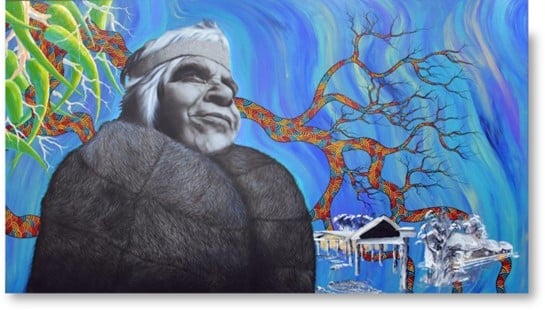In addressing the profound challenges faced by our most vulnerable children and young people, relying on high-cost emergency accommodations (HCEA’s) such as hotels and motels is not just economically taxing—it…
Celebrating NAIDOC: For Our Elders

In honour of the NAIDOC Week 2023 theme, For Our Elders, we highlight the monumental legacy of prominent Wurundjeri Elder, Aunty Winnie Quagliotti (née Terrick) a leader in the Aboriginal civil rights movement.
Aunty Winnie’s impact has shaped modern perspectives of aboriginal health and the civil rights movement, touching countless families and communities.
Early Activism
Born at a station in Koondrook-Barham on the boarder of NSW and Victoria in 1931. In her youth, Aunty Winnie would stay in Fitzroy with relatives, at a turbulent time of the cultural landscape of Melbourne City. There she would be witness to the rise of the Aboriginal civil rights movement.
In adulthood, Aunty Winnie would marry, have children of her own, and foster many more. With the help of her brother, she formed an association with other local families to provide housing, health, and welfare services to the Aboriginal community. Employment support was also provided.
In 1975, the association was incorporated as the Dandenong and District Aborigines Co-operative Society Ltd (DDACSL). Aunty Winnie was the organisation’s first chairperson, a position she held until 1988
The DDACL expanded in 1980s, with Aunty Winnie an instrumental force in developing family support programs including the Burrai Child Care Centre (one of the first multifunctional Aboriginal childcare centres). Education on culture and family aid also shaped Aunty Winnie’s contribution to the co-operative.
Aunty Winnie was an active voice in the campaign to improve housing for Aboriginal people. In 1981, she chaired the Narrogal Co-operative Housing Society, which provided home loans to Aboriginal people and families.
Aunty Winnie was one of the first people appointed to the Aboriginal Housing Board of Victoria (AHBV). She represented the Western Port region and chaired the board in 1987–1988.
Voice of a generation
Aunty Winnie was vocal about the Australian government’s repeated efforts to fund Aboriginal based services without consulting communities on how the money should be allocated.
Aunty Winnie was a highly respected Elder and community spokesperson for the Wurundjeri people. Called on by local, state, and federal members and ministers for her insight and guidance. Even having an audience with the late Queen Elizabeth. She educated communities on the need to preserve and carry-on Aboriginal culture.
During her lifetime, Aunty Winnie was recognised for her significant efforts to raise the profile of the Wurundjeri people as Traditional Owners. She was a community leader who dedicated her life to the welfare of her people. Sharing vital cultural knowledge, in the hope that it may continue to be passed on.
An enduring legacy
In 1988, Aunty Winnie protested the docking of tall ships in Melbourne harbour as part of the nation’s bicentenary celebrations. The image of her standing defiantly in her possum skin cloak was a powerful one and inspired a mural commissioned by the International Labour Organisation, which reflected Aunty Winnie’s image onto a building in Wall Street, New York.
Sadly later in 1988, Aunty Winnie suffered a stroke at 56 and passed on. The imprint her legacy continues to leave on her community is profound and enduring. Remembered for her tenacity and commitment to change. This NAIDOC week we honour Aunty Winnie, and those that follow in her footsteps.
Want to learn more about Aunty Winnie? Read her full story
NAIDOC Week runs 2-9 July, celebrating the contributions of Aboriginal and Torres Strait Islander people in culture, community, art and performance. Visit the official NAIDOC page to learn more about this year’s theme.
Sign up to the OzChild mailing list
Stay up to date with the latest news and events.
Choose your region
Select your region to create an enhanced and personal experience.
